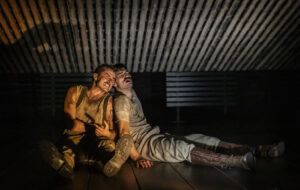This is the second adaptation of Sebastian Faulks’s unforgettable novel Birdsong, adapted by Rachel Wagstaff and directed by Alastair Whatley. Faulks wrote his original novel, part of a trilogy, because he felt that the stories of the WWI soldiers were not covered adequately in other written tomes. This production concentrates on the experiences and inner tribulations of said soldiers before, during and after their lives in the trenches. Particularly featured are the sappers who were at the time, and since, often not acknowledged for the bravery in digging tunnels under enemy lines, setting explosives and frequently losing their lives in the process.
The onstage set is sparce, designed by Richard Kent, its colours and fabric reminiscent of the countryside areas of France in which WWI was fought. The blocks of hanging wooden slats filter light ominously on to the stage with increasing and decreasing intensity. The ceiling of the set is a hanging fringed panel which, shockingly, falls to the stage with a crash at the end of the second act. It is various props that create the settings, their arrival slickly choreographed by the cast. Again emphasising the minimalism of the production.
The sound created by Dominic Bilkey alongside Jason Taylor’s lighting perfectly draws us in to the action; often surprising us with explosions as well as the bird song in the lulls in fighting and even the ticking clock in the Azaire’s drawing room in Amiens.
There is an aura of claustrophobia throughout the three acts of this production, even in the the domestic setting of the Amiens home where Isabelle Azaire (Charlie Russell) lives, controlled by her abusive husband Rene (Sargon Yelda). The arrival of Stephen Wraysford (James Esler) shatters their lives as he and Isabelle embark on a passionate love affair.
It is this affair that sustains and tortures Wraysford through the nightmare of the futile war in the trenches.
It is hard to believe that this is James Esler’s debut theatre role. His portrayal of the idealistic young man to a jaded, slightly unhinged army officer is faultless and beyond powerful. He’s rarely off stage and when on he’s compelling. Quite an undertaking for a young actor to say the least.
Charlie Russell’s Isabelle is multi-layered – unhappy and totally controlled by her monstrous husband then released from that by her love and passion for the young man who enters her life, freeing her from her domestic prison. Russell portrays those emotions with great integrity and is a triumph in her own right.
Natalie Radmall-Quirke brings energy, depth and genuine warmth to the complex Jeanne Fourmentier, Isabelle’s sister. Her character develops considerably between the different times is which we meet her.
Max Bowden’s Jack Firebrace stands out above all others as he deals with his concerns for his family at home and ultimately the death of his son from diphtheria as well as the horrors of what is happening around him in wartime France. He also perfectly illustrates the closeness that develops between his fellow soldiers and his commanding officer Wraysford.
James Findlay not only plays Brennan, his singing voice being as powerful as his acting, but is also the musical director. The subtlety of music, designed by Tim Van Eyken, effortlessly and subtly weaves its way, enhancing the scenes where it features.
Don’t forget, however, that this is very much an ensemble piece with regards to the supporting cast who double up playing characters across the three acts.
The third strain to this story is the search by Jack Firebrace’s grandson (in the original novel this was a granddaughter) for his grandfather’s grave – never found. This is particularly relevant to my own journey of finding my Great Uncle and Great Grandfather’s war graves and visiting them. Both had been killed in WWI and the families had no idea of their resting places and standing at their graves in the bright summer French sunshine is something I will never forget. I applaud Faulks and Rachel Wagstaff for bringing recognition to them and the thousands who died in a futile conflict that devastated whole communities here and in Europe.
There is no let up to the pain which weaves its way through this production, heightened by the odd quip or humour to heighten the tragedy of loss and heartbreak. However, it is beautiful in its darkness and is the most powerful piece of theatre I have seen for decades.
https://www.atgtickets.com/shows/birdsong/theatre-royal-brighton/











I agree. An extremely poignant piece. Very moving.
I saw it in Chichester, it was wonderful. Standing ovation by all